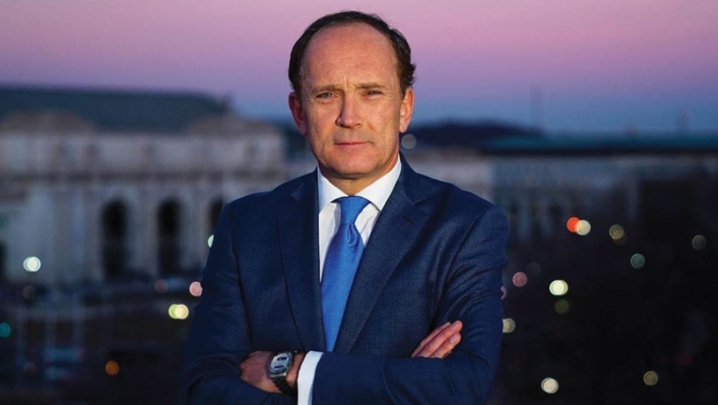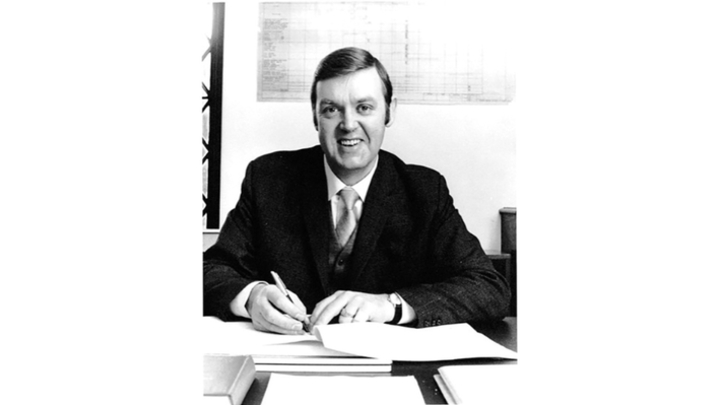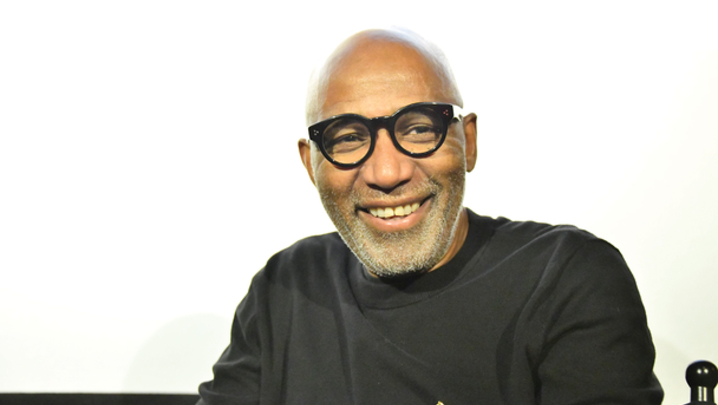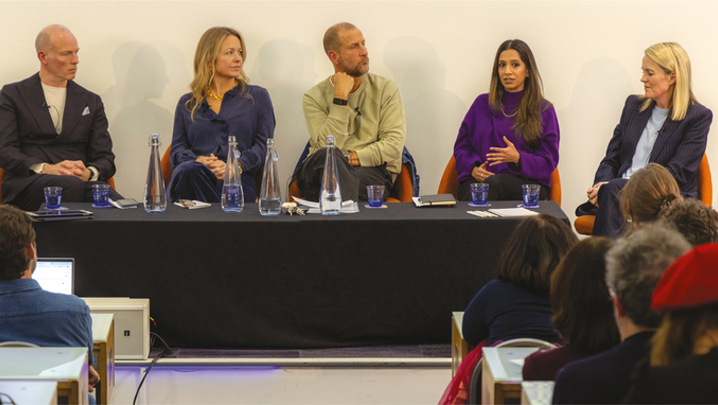As Ken Burns’s magisterial The Roosevelts hits British screens, he discusses how he composes his epic documentaries
In a TV landscape characterised by audiences demanding instant gratification and producers claiming that the commissioning process is killing creativity, Ken Burns stands out as a total anomaly.
Widely seen as one of the most influential documentary makers of all time – his landmark film, The Civil War, was watched by upwards of 40 million viewers in the US – Burns is in the fortunate and enviable position of being able to call all the shots on all the films that have his name on the credits.
"Being in control of a creative process is a good thing...," he says. "If you don't like the films I make, it is my fault. I take that above the team. I am the conductor of a little ensemble, but it's my fault."
He adds: "I like that. I'm free. No commercial sponsor can tell me, 'We want more of this, less of that.'"
Burns is in London to promote his latest opus, the seven-part, 14-hour marathon, The Roosevelts: An Intimate History, some seven years in the making and hailed by some US critics as his best yet.
For sure, it has all the usual Burns virtues – it is painstaking and exquisitely crafted; the auteur takes us through the complex narrative of Theodore, Franklin and Eleanor Roosevelt from 1858 to 1962 using carefully shot stills, talking heads, archive footage, emotive narration and haunting music.
Not really the thing viewers are expected to take a shine to in the age of YouTube.
And yet more than 9 million people watched the first episode of The Roosevelts when it premiered on PBS in the US last month; the series will be shown in the UK on PBS America from 19 October.
"The pace is at times fast, at times stately, contemplative, but I don't see that as pejorative," he suggests. "I suppose, in comparison with MTV or YouTube, maybe it's demanding of people, but that's OK."
Burns continues: "I think people are hungry for meaning. All real meaning accrues in duration.
"We're buried in information with no understanding or real meaning, and no way to connect the dots."
He is a dapper, diminutive man who looks younger than his 61 years, erudite and scholarly: during our 40-minute conversation he quotes Emily Dickinson, Mark Twain, Ralph Waldo Emerson and William Blake.
They are three extraordinarily interesting, complicated, flawed, wounded people, so you've already got Downton Abbey, only true
Burns, the recipient of 12 Emmy Awards and two Oscar nominations, says he knew when he was 12 years old that he wanted to make films.
Family tragedy led to the epiphany. His mother died when he was 11 after being sick for 10 years. "There was never a moment when I was growing up when she wasn't dying of cancer. As you can imagine, our household was a grim and demoralised place," he recalls.
"I watched my father cry for the very first time, not at my mother's illness, or her death or her funeral, but watching Odd Man Out, Carol Reed's film about the Irish troubles, where James Mason gets it in the end."
He "realised immediately what movies could do – provide a safe harbour to express and contain emotions that are difficult to express. It was that which made me want to be a film-maker. At that point, it meant being Howard Hawks, Alfred Hitchcock or, particularly, John Ford."
But discovering social documentary stills photographers during his college years had a profound influence – although there might have been a genetic one, too.
Burns's father was a cultural anthropologist and an amateur stills photographer. He remembers watching him develop photographs in the basement of their Delaware home.
He was in his early 20s when he realised that making history films would be his destiny. "Within a few years of graduating, in 1975, I knew history was what I wanted to do," he reflects.
His first documentary, Brooklyn Bridge, cost $180,000 to produce and was Oscar nominated when it was finally shown on PBS in 1981.
He still keeps the "hundreds" of rejection letters he received in trying to get the film up and running to remind him that tenacity is an important part of any film-maker's mental armoury.
Was it easier for him to get that first break than it is for today's generation? "No. Maybe doing what I'm doing, it would be harder – but it was so hard.
"I tell kids it is mostly about perseverance... As difficult as it is, there's a kind of perfection to it. You sort of earn it."
On the back of Brooklyn Bridge's success, he was encouraged to uproot to the movie-making capital of Los Angeles. Instead, the academically inclined Burns quit Manhattan for New Hampshire and bought the converted barn where he still lives today.
His subjects have always been the defining events, people and places in American history. They have included the Statue of Liberty, Congress, the Civil War, baseball, jazz, the Second World War and the US national parks, plus biopics of Thomas Jefferson, Frank Lloyd Wright and Mark Twain.
From the beginning, Burns chose to distribute his work on public television. That way, he could maintain artistic control and his audience would be able to watch the films free from commercials.
"I make films for everybody... Our ratings are as good in Oklahoma as they are in New York City, sometimes better."
Sooner or later, it was likely that Burns would focus his attention on the Roosevelt clan, but what specifically drew him to these aristocrats of American politics?
"They are three extraordinarily interesting, complicated, flawed, wounded people, so you've already got Downton Abbey, only true," he replies. "You also have a political family that has touched more American lives than any other family in American history that has not been done significantly together on television.
 "There's lots of stuff on Theodore and Franklin, some on Franklin and Eleanor, a little bit less on Eleanor, but nobody had put them together in a very complex narrative that intertwines their ultimate dependence and relationship to one another. Exponentially, that increases the complexity and the interest in it." But will the series resonate with UK viewers? "Yes, absolutely. William Blake said you could find a world in a grain of sand... These are human stories and universal stories. That's what I am interested in."
"There's lots of stuff on Theodore and Franklin, some on Franklin and Eleanor, a little bit less on Eleanor, but nobody had put them together in a very complex narrative that intertwines their ultimate dependence and relationship to one another. Exponentially, that increases the complexity and the interest in it." But will the series resonate with UK viewers? "Yes, absolutely. William Blake said you could find a world in a grain of sand... These are human stories and universal stories. That's what I am interested in."
As befitting his reputation as a workaholic, at any one time Burns is invariably juggling several different projects.
At the moment, films on the history of cancer (The Emperor of All Maladies), the history of country music (I Can't Stop Loving You), a so-far untitled biography of Ernest Hemingway and a 10-part history of the Vietnam war (also untitled) are in production.
As, too, is a series about Jackie Robinson, the first African American to play in Major League Baseball in modern times.
Five or six other films "are threatening to start". He says: "It's like air-traffic control. I just go from one thing to another."
In development are documentaries examining the East Lake community in Atlanta, transformed by a team of philanthropists, and a film on the history of stand-up with Chris Rock and Jerry Seinfeld.
The latter has been some 20 years in gestation and is a partnership with one of Burns's four daughters, Sarah, and her husband, film-maker David McMahon.
Prolific he may be, but clearly Burns is not Hollywood rich. Do his films make money?
The interns in my editing room have an equal say with people I've worked with for 35 years
For once, he pauses before answering: "Many do not... I give the films to public television by virtue of their contribution to the budget. Or the requirements of some of the granting agencies, such as the Corporation for Public Broadcasting. There's no money there.
"We sometimes make money in companion books that do well and if there is programme income, meaning DVD sales, we pay off those granting agencies that require a payback. And what's left, besides points to producers, goes into development."
He receives a relatively modest salary from Florentine Films, the company he co-founded back in the 1970s, according to a report in Forbes.
The Roosevelts cost $15m and was financed by PBS, the Corporation for Public Broadcasting and Bank of America, plus money from wealthy individuals and small and large foundations. This, of course, all takes time to assemble.
Over the years, has finding backers become more difficult? "Funding has always been terrifically hard. It has gotten more difficult only in so far as I've taken on more projects at a time."
His collaborators have remained constant over more than three decades. Burns might be a control freak (he bristles at the word "freak") but his working domain sounds like a civilised place.
"I see people in my profession treating other people of lesser rank – I feel awkward even saying that – abysmally. I find them diminished by that.
"The interns in my editing room have an equal say with people I've worked with for 35 years."
The Roosevelts is co-written by Geoffrey C Ward, a long-time member of Team Burns. Do they ever argue?
"We've worked together for 32 years and we've never had a fight. There have been times when I've seen him put his head down because I've cut something he's written. Sometimes I've been impatient because I work at really high speeds... Any disagreement we express right away and we work it out.
"I know a lot of other film-makers who are screamers and they get things done. I guess it works, but this is not brain surgery. You get to yell at somebody if they don't hand you the right scalpel."
The Burns method
'It is very labour intensive. We thank legitimately a couple of hundred people in the credits but these are handmade, even the long ones, by about a dozen people.
'Most productions would have a research period followed by a writing period. We'd then produce a script written in stone that, with minor changes, informs the shooting and, again with minor changes, the editing.
'We never stop researching and we never stop writing. We often start off with the left hand not knowing what the right hand is doing. We often interview before the script is written so that, when you see a talking head, it is a happy accident of trial and error where the placement goes.
'This process allows you to be corrigible until the end...'
The power of music
'Music is one of the most powerful forces on earth and is an equal partner. We record our music before editing or early in editing.
'So we might be cutting a sentence to fit a phrase of music, or extending it to fit that same phrase of music, because we want it to be as organic and authentic a force as the still photographs, the newsreels, the talking heads, the live cinematography, the first-person narration, the third-person narration, the complex sound effects...
'In most films you run out of money before you start thinking about the music, so the music becomes something loud...
'It's no accident that the first time a documentary soundtrack went gold was The Civil War, and the first time it went platinum was Jazz.
'Already people are coming up to me and saying, "I love that piece of music in The Roosevelts."'







